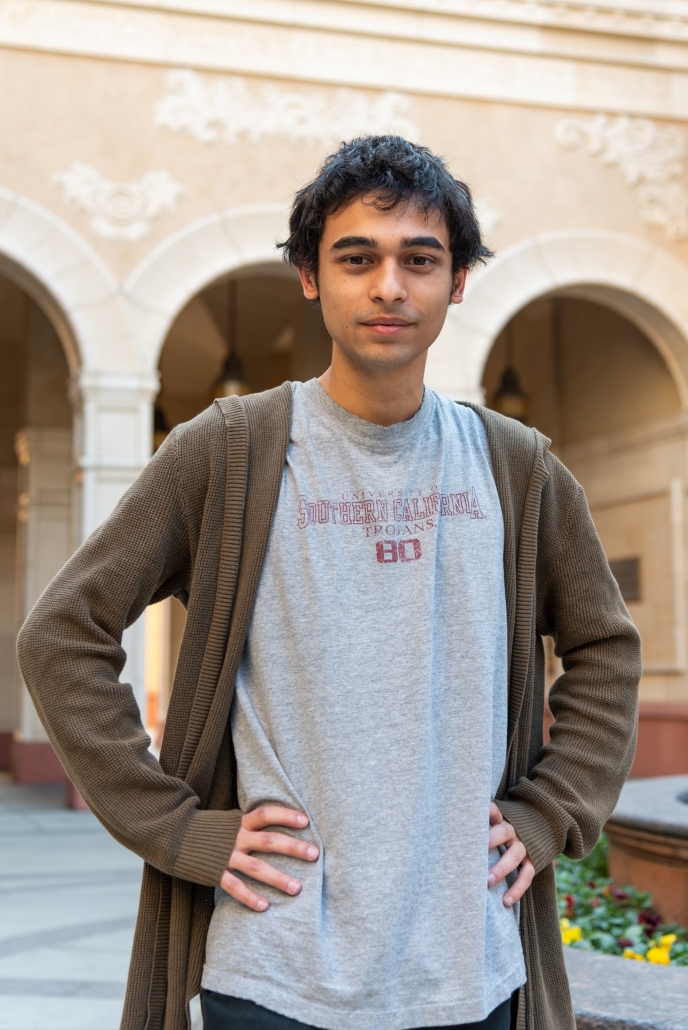Students engage in cinematic theory discussion

A dozen cinema and media studies students meet every other Friday afternoon to share their thoughts on films and social issues. The reading group, also known as CAMS reading group, launched in Fall 2019 in the School of Cinematic Arts’ Cinema and Media Studies division.
Greg Ferrer, a junior majoring in cinema and media studies, started the group to create a niche at USC for students interested in theoretical discussion. Ferrer said he was inspired by the small, informal discussion club at Pasadena City College, where he transferred from last year.
“I tried to start [this reading group] with the help of my professor, Aniko Imre, for just people in the department who weren’t so interested in film production,” Ferrer said. “I really wanted to find a kind of theory nerd community in the film school … I was kind of surprised that nothing like that existed over here.”
Imre, the director of undergraduate studies in the division of cinema and media studies, serves as the faculty mentor for the student-run reading group. She said the group consists of students with passion in cinematic theories and sociological concepts represented through films.
“[Members] develop into very spontaneous discussions, they go into undiscovered and unanticipated directions,” Imre said. “They’re also often very open-minded-thinking creatures who are here because they want to meet like-minded movie nerds who live in this intersection of the social world and cinema and theory.”
Ferrer said he would listen to members’ advice when choosing the short articles or book chapters as reading material in order to let them guide the discussion.
“[Members] want to explore things that weren’t usually being assigned by the curriculum [of cinema and media studies],” Ferrer said. “I try to let the people in the group guide it. I’m always open to suggestions for reading. I don’t like to pick every one of them.”
Imre said discussion topics are not confined to film and are inspired by readings on a wide range of topics, such as the influence of social media in pop culture.
“These are fairly colloquial discussions about … issues that might be of particular interest to cinema students, such as surveillance, new technologies, social media but also capitalism and its alternatives,” Imre said.
Ferrer said members also said the group serves as a safe place to share thoughts and ideas on SCA, including the lack of research opportunities.
“It’s interesting that [the reading group] also become a place … to discuss USC, to discuss the School of Cinematic Arts and just to get everybody’s perspective on this institution that we’re all part of but we don’t really talk about or share our views with everybody else,” Ferrer said.
Imre said she tries not to act like a teacher during the group meetings in order to give students freedom for spontaneous discussion.
“It’s a very egalitarian, very democratic group without the pressure of grades, without performance anxiety,” Imre said. “Everybody wants to be there because they just want to share.”
Unlike discussion sections common in USC courses, Imre said this seminar-like reading group offers students opportunities to shape the direction of the discussion.
“It’s kind of a training in educated conversation, keeping arguments in your hand, making sure the conversation doesn’t get so multi-structured and elusive that you lose sight of it,” Imre said. “It’s also a skill in moderating discussion.”
Imre said the fact that the CAMS reading group is outside of the SCA academic system is the main reason it attracts students to voluntarily devote their time to attend the organization’s discussions.
“Students in general yearn for something that’s not predetermined, that they don’t do for a certain purpose,” Imre said. “The reason why this club is a good idea and why it attracts people is precisely because the learning is for learning’s sake, [and] you can just be yourself.”
Imre said cinema and media studies students need to find their own tracks through taking different classes, since there is not a predetermined and specialized route for them, such as film production and screenwriting. Imre said this aligns with the core of the reading group.
“This club is really one of the epitomes for a major like [cinema and media studies],” Imre said. “It is truly a ‘build your own adventure.’ Students do this on their own — they volunteer their time, they pick the reading, they shape the discussion.”
Imre said cinema and media studies students may have difficulty finding like-minded peers because the curriculum mostly consists of large, lecture-style classes. Thus, the reading group serves as a close-knit community for cinema and media studies students to make friends.
“It’s not just about having intellectual conversations, it’s also about bonding,” Imre said. “It’s also about giving our students an opportunity to connect, which is much easier for screenwriting students, because they have small classes from the beginning.”
Lucy Allen, a junior majoring in cinema and media studies, echoed Imre’s concern that there is less cohesion among cinema and media studies students.
“I think a lot of people had the experience that it’s not super easy to meet other people in the major because we don’t have a lot of smaller classes that are major-specific,” Allen said. “This has been a cool way to connect people in a setting more like a seminar.”
Another member of the reading group Lukas Harrington, a senior majoring in cinema and media studies, said he joined the CAMS reading group to make friends who share interests with him.
“Everyone always gets a chance to talk and share what they’re interested in,” Harrington said. “We really get to go all over the place and talk about politics and talk about film theory … and explore different perspectives on it.”
Ferrer said that as a transfer student, he felt isolated before starting this reading group, which offers him the opportunities to have small-group discussion as he used to do in a city college.
“Personally, USC can be kind of isolating, I think, and I wasn’t really talking to anyone about [theoretical discussion about films],” Ferrer said. “I was excited to go to a place where I’d be able to have these kinds of discussions when I was in a city college, so I did my best to carve out that little niche.”

